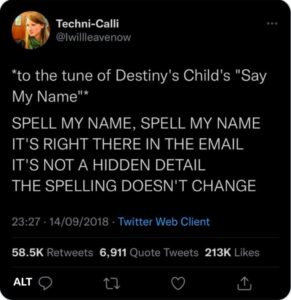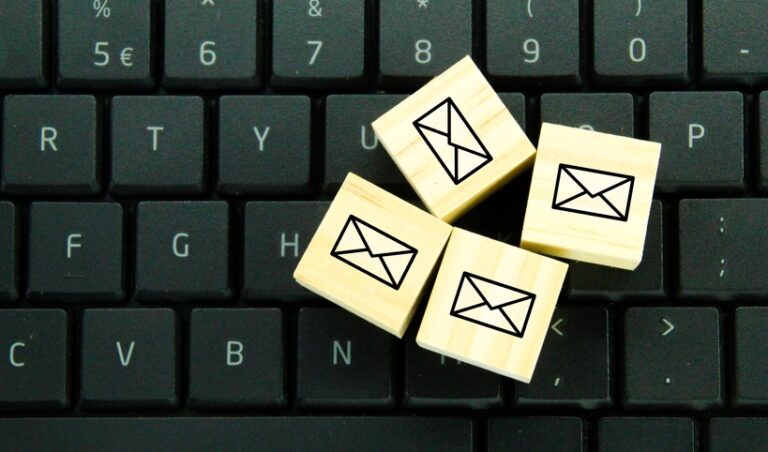It’s not “just an email”. Think what you are writing.
—–
When it comes to work email etiquette, DO…
…make an effort
Work emails don’t have to be literary works of art. Nor do they have to exhibit wit of the calibre of Oscar Wilde. But there is nothing like receiving an email which is in some way idiosyncratic or personalised.
That could mean the sender remembering some detail like me having been on holiday (“I hope you had a great time in [Canada/Spain/York]!”) or making some remark on the rubbish summer weather we’ve been having.
It doesn’t really matter. By taking a few seconds to write something specific to this email and specific to me, the sender indicates that I matter and am worth their time and effort. That gets my attention and makes me open to what they might need or want from me.
…flaunt your linguistic dexterity
I love people who love language. I love people who know how to spell and punctuate correctly. I love people who are so well informed about the way the English language works that they can be creative with it and even take the odd liberty. You are my CREW!
If you slip a play-on-words into your email, make a witty aside — or just build sentences that read nicely — I’m going to be instantly well-disposed towards you.
To me, good writing in work-a-day emails is just as effective and impactful as an attractive business card or website.
…structure your writing and ideas properly
I have worked with many people who can talk for 20 minutes without saying a single thing. Those are the same people who can write me a great long email instructing me to do something — and yet leave me clueless about what they actually want.
Generally, keeping emails short and sweet is best. However, if you have to write a longer email, embrace headings, lists and bulletpoints. They break up and structure emails and make them easier to read and absorb. You want the addressee to listen to and understand what you say, so make it easy for them.
Opening up an email which is obviously well structured makes me smile inside. Even the first glance tells me: time and thought has been invested in this. That makes me want to start reading.
…subtly let me know where our relationship stands with how you sign off on emails
This could be a British thing — so if you’re not British, or simply not interested in the impenetrable jungle of the British psyche, please feel free to skip forward to the next point. No hard feelings.
But if you’re sticking around, let’s dive right into the deep blue sea of British madness.
We British don’t lead the field in very many things currently — but we do have indirect communication and passive aggression down to a fine art. And the way British people sign off emails will tell you a lot about how they feel about you. They might always sound friendly and polite, but with the Brits, there’s mostly some subtext to be understood. Because we like to say stuff by…not saying it. Or by saying something else. Which is something the Americans just LOVE.
For example:
If a Brit who generally signs off their emails with “Best” suddenly writes “All the best” — you may assume that they have developed some very positive feelings towards you. Ditto if “Best regards” becomes “Kind/warm regards”. If I ever write “Warm regards” in an email to you, let it be known that my enthusiasm for your person is now adoration-adjacent.
However: if the dynamic moves the other way, beware. If a Brit signs off an email with a simple “Regards” — you can safely assume that they are fuming about something you have done and you should think very carefully about how to proceed. A solitary “Regards” at the end of an email is LOADED. “Regards” is British passive aggression in its finest, most acute and distilled form. You should fear “Regards”.
In short: email sign-offs are a gift to the British, as they let us communicate some big feelings without having to…express those big feelings. At least to each other. Everyone else just thinks we are nuts.
DON’T…
…spell my name wrong any more than once
I like my name. I like that my parents chose a first name for me which — in some form — is recognised in many different countries around the world. And I like that the spelling is classic, straight from the ancient Greek word “katharós”, meaning “pure”.
What’s more, I like my surname — being the surname of one of English literature’s greatest heroines. “Katharine like Hepburn, Eyre like Jane”, I bleat into the telephone time after time — ever hopeful that my interlocutor will get at least one of the references.
Which never happens. As it is, my surname confuses almost everyone outside the English-speaking area. And my first name foxes everyone in it.
In view of the number of options for spelling my Christian name (Kathryn, Catherine, Katherine, Cathrin…), I do have a certain sympathy for mistakes made — at least when the information has only been communicated verbally.
Excuses run aground when we’ve been corresponding continually by email or over social media (where I use my real name) and you still get it wrong. Quite why people look at my email address, my e-signature, my social media/BTL handle and continue to address me as “Katherine” is beyond me.
And I’m not alone. A selection of the name-spelling disasters encountered in my circle of friends, if I may:
“I’m called Hannah. Just Hannah. It’s not short for Johanna.”
“No, Nicola is not ‘the same name’ as Nicole. My name is Nicola.”
“My surname is Brook, spelled B-R-O-O-K.” “Is that with an ‘e’ on the end?” “Erm…no — it’s how I just spelled it.”
I feel this Tweet so deeply:

Please — just do me the honour of paying a little attention. Spelling matters. And nowhere more than when it’s in a name.
…trot out worn-out, nonsensical corporate BS phrases
Anyone who starts their emails with “I hope this email finds you well” will find themselves on a very steep, very rapid downwards trajectory in my estimation.
Why do people write this? It’s utter nonsense. Emails don’t “find” you — well or otherwise. Emails don’t “find” anything. Because they are EMAILS. Inanimate things. Just stick to “I hope you are well” and all will be well.
While we’re at it: don’t ask me to “action” anything — “action” is a noun and not a verb. Don’t ask me to “hop on” a call. And don’t write that you’ll “reach out to me” — unless of course you are currently sitting two feet away and are able to literally extend your hand and touch me. In which case you don’t need to send an email.
For the love of God, park the linguistic inanities and write common sense.
…think that emails are the only way to “do” communication
I’ll be honest: I am not a fan of the telephone. Nor am I photogenic — my spirits sink every time I have to talk to someone over Zoom or Google Meets and be seen on camera. I just don’t feel comfortable.
There are a handful of people who I can happily chat to on the telephone or on a video call. Mainly family members and good friends who I have known for years. Finding anyone else outside of this circle of people to whom I can happily chat remotely is an event rarer than sighting Halley’s comet — as it rushes past a shooting star.
So, believe me, I’m fine with conducting the larger part of my business communications via email. But sometimes, there is no substitute for picking up the phone or scheduling a video conference. There are problems that can’t be sorted out effectively via email. And good interpersonal relationships are exactly that: personal. Let’s not lose sight of that entirely.
…constantly give lame excuses as to why you are replying late or why something hasn’t been done
Life throws curveballs at you. Unexpected tasks come up, people get ill. And that all impacts on when and how stuff gets done.
And, while some situations require you to explain yourself — excuses should be used sparingly. Otherwise you just come across like some kid who never hands their homework in on time and blames the dog. It’s infantile. Most of the time, I don’t care what happened — all I’m looking for is an apology for the delay and for stuff to get done and answers given in a punctual way henceforth.
As far as excuses are concerned, less is most definitely more.
—–
Related articles:
Starting a new career in your 40s – this much I know
What the British say and what they actually mean – a brief guide
—–
Photo credit: fauziEv8 on Envato Elements
